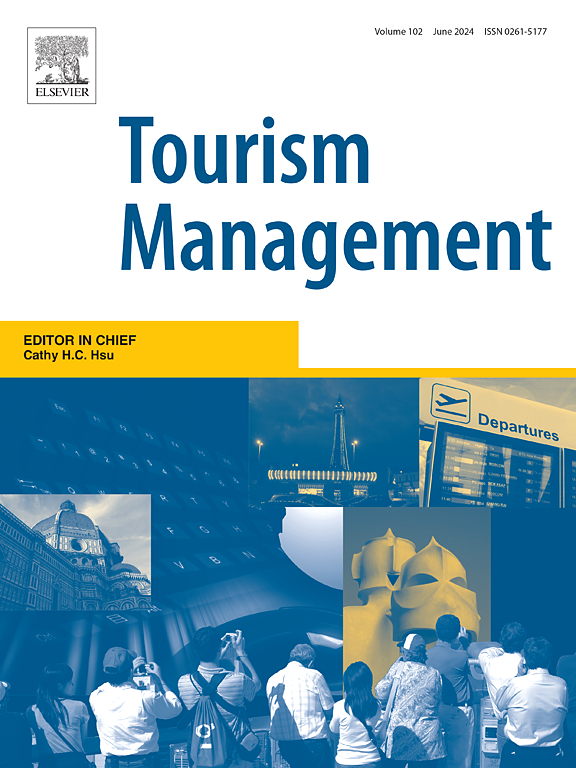Sleepy travelers on holidays: How social jetlag affects intention to participate in tourism activity
IF 12.4
1区 管理学
Q1 ENVIRONMENTAL STUDIES
引用次数: 0
Abstract
Social jetlag, the misalignment between an individual's biological clock and social time, is common in daily life. Travelers may experience it when their circadian rhythm mismatches with travel schedules. We examined how social jetlag impacts individuals differently while traveling. Using public data, we confirmed that short sleepers are more likely to engage in impulsive and socializing activities (Study 1). Then, two experiments were conducted to compare the effects of social jetlag in a tourism context. The interaction effect of chronotypes and the timing of activities showed the opposite direction, with social jetlag decreasing travelers' intention to participate (Study 2). We found that this effect was mediated by higher fatigue and lower state impulsivity (Study 3). This research explores how chronotypes and activity schedules influence tourists' resource conservation strategies, offering evidence of synchrony effects. The findings provide insights for marketers to tailor tourism products to travelers' chronobiological traits, enhancing their well-being.
假期困倦的旅行者:社会时差如何影响参与旅游活动的意愿
社交时差是指个人的生物钟与社交时间不一致,在日常生活中很常见。当旅行者的昼夜节律与旅行时间表不匹配时,他们可能会经历这种情况。我们研究了旅行时社交时差对个人的影响。通过使用公开数据,我们证实了短睡眠者更有可能从事冲动和社交活动(研究1)。然后,进行了两个实验来比较社会时差在旅游背景下的影响。时间类型与活动时间的交互作用呈现相反的方向,社交时差降低了旅行者的参与意愿(研究2)。我们发现这种效应是由较高的疲劳和较低的状态冲动性介导的(研究3)。本研究探讨了时间类型和活动计划对游客资源保护策略的影响,提供了同步效应的证据。研究结果为市场营销人员提供了见解,可以根据旅行者的时间生物学特征定制旅游产品,提高他们的幸福感。
本文章由计算机程序翻译,如有差异,请以英文原文为准。
求助全文
约1分钟内获得全文
求助全文
来源期刊

Tourism Management
Multiple-
CiteScore
24.10
自引率
7.90%
发文量
190
审稿时长
45 days
期刊介绍:
Tourism Management, the preeminent scholarly journal, concentrates on the comprehensive management aspects, encompassing planning and policy, within the realm of travel and tourism. Adopting an interdisciplinary perspective, the journal delves into international, national, and regional tourism, addressing various management challenges. Its content mirrors this integrative approach, featuring primary research articles, progress in tourism research, case studies, research notes, discussions on current issues, and book reviews. Emphasizing scholarly rigor, all published papers are expected to contribute to theoretical and/or methodological advancements while offering specific insights relevant to tourism management and policy.
 求助内容:
求助内容: 应助结果提醒方式:
应助结果提醒方式:


